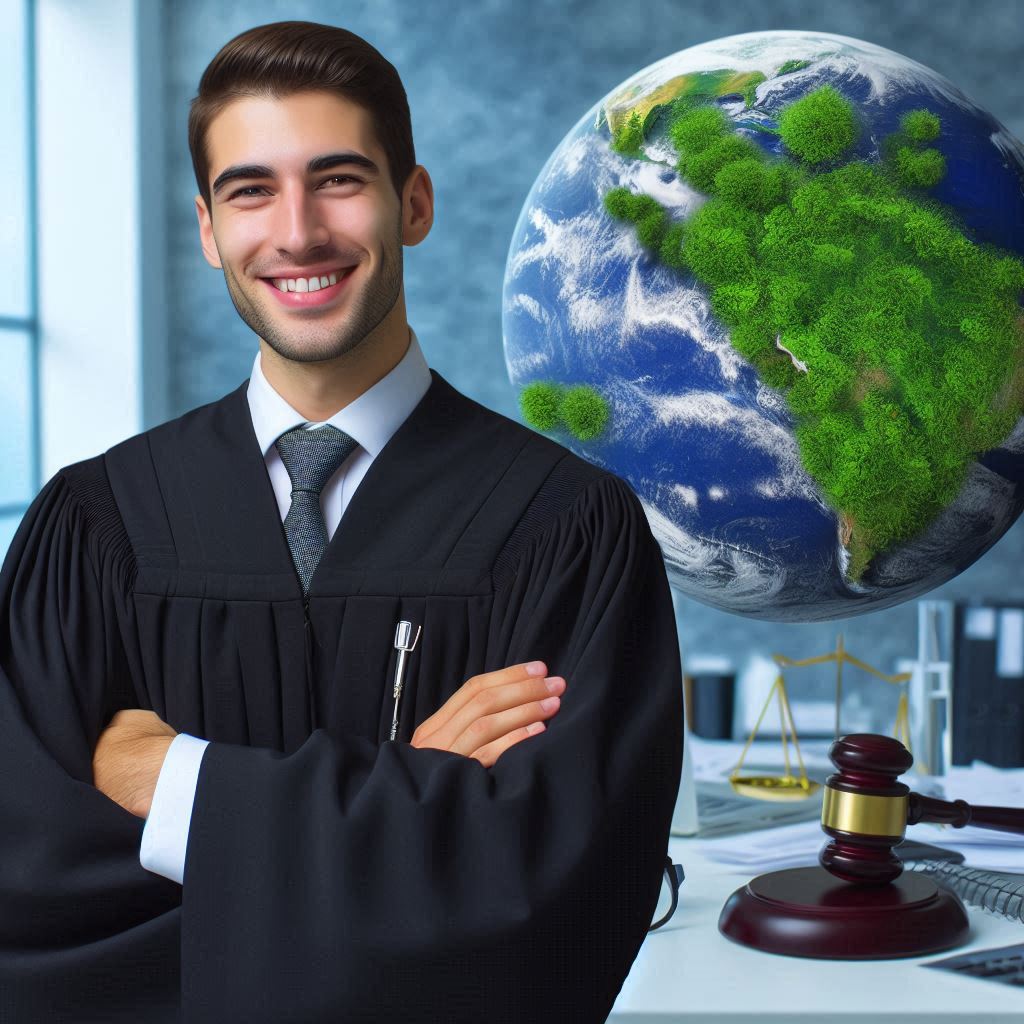Introduction
Environmental lawyers play a crucial role in safeguarding the planet’s natural resources.
They advocate for policies and regulations that protect air, water, and land from pollution and degradation.
Their work involves representing clients in legal disputes, advising on environmental compliance, and shaping public policy to promote sustainability.
As the guardians of environmental law, these professionals are instrumental in ensuring that environmental protections are upheld and that violators are held accountable.
In an era where environmental issues are more pressing than ever, the role of environmental lawyers has become increasingly vital.
They tackle a wide range of cases, from fighting illegal dumping and industrial pollution to ensuring adherence to conservation laws.
Their efforts contribute to cleaner air and water, healthier ecosystems, and a sustainable future for all. Without their expertise, many of the protections we take for granted might not exist.
Despite their critical role, environmental lawyers today face numerous challenges.
One major issue is the growing complexity of environmental regulations, which requires constant updates and extensive knowledge.
The political landscape has also shifted, with some governments prioritizing economic growth over environmental protections, creating additional hurdles for advocates.
Furthermore, they often face opposition from powerful corporations with significant resources, making legal battles more arduous and costly.
Another challenge is the increasing prevalence of environmental issues such as climate change and biodiversity loss, which complicate legal strategies and demand innovative solutions.
These issues are global in nature, often requiring international collaboration and sophisticated legal approaches that can stretch the limits of existing frameworks.
In summary, while environmental lawyers are essential for protecting the environment, they must navigate an increasingly complex and hostile landscape.
Their perseverance and adaptability are crucial as they continue to champion the cause of environmental justice in the face of growing challenges.
Lack of strong environmental laws
The lack of comprehensive environmental laws in some regions
One significant challenge environmental lawyers face is the lack of strong environmental laws, which hinders their efforts to safeguard the environment.
In many regions, environmental regulations are either outdated or insufficiently comprehensive, creating significant obstacles for those striving to enforce environmental protections.
How weak laws make it difficult for environmental lawyers to protect the environment
The absence of robust laws means that environmental lawyers often find themselves working within a legal framework that offers limited support for their cause.
For instance, in countries where environmental regulations are weak, lawyers struggle to hold corporations and governments accountable for pollution and environmental degradation.
This inadequacy can lead to prolonged legal battles and less effective enforcement of even the existing, albeit insufficient, regulations.
Transform Your Career Today
Unlock a personalized career strategy that drives real results. Get tailored advice and a roadmap designed just for you.
Start NowExamples of countries where environmental laws are inadequate and the impact on the work of environmental lawyers
Take, for example, countries with developing economies where environmental legislation has not yet evolved to address modern challenges.
In such regions, weak environmental laws can fail to address critical issues like air and water pollution or deforestation.
As a result, environmental lawyers may encounter difficulties in proving the harmful impacts of industrial activities or securing meaningful penalties for environmental violations.
This situation not only hampers their ability to protect natural resources but also undermines their efforts to advocate for sustainable practices.
In contrast, in regions with stronger environmental regulations, environmental lawyers benefit from more comprehensive legal tools and frameworks to address environmental issues.
They can pursue more effective legal actions and work towards stricter enforcement of regulations.
Ultimately, the lack of strong environmental laws remains a significant challenge for environmental lawyers, highlighting the need for ongoing advocacy and reform to ensure that legal systems are equipped to address contemporary environmental issues effectively.
Read: Public Speaking Tips for Civil Rights Advocates
Resistance from government and corporations
Environmental lawyers face numerous challenges in their efforts to protect the environment and uphold environmental laws.
One significant obstacle they encounter is the resistance from governments and corporations.
This resistance poses a threat to environmental regulations and complicates the work of environmental lawyers.
Challenges Faced
- When governments and corporations oppose environmental regulations, environmental lawyers must strategize and develop legal arguments to counter their objections.
- Environmental lawyers need to navigate complex legal battles against powerful entities who have vast resources and legal teams at their disposal.
- High-profile legal battles between environmental lawyers and large corporations or governments serve as case studies to illustrate the challenges faced in such situations.
Resistance from governments and corporations can manifest in various forms, such as lobbying efforts to weaken environmental laws, challenging the legality of regulations in court, or refusing to comply with environmental directives.
Environmental lawyers must be prepared to meet these challenges head-on and advocate for environmental protection despite opposition.
Developing Legal Strategies
Environmental lawyers facing resistance from governments and corporations must develop sophisticated legal strategies to defend environmental regulations and initiatives.
This may involve conducting research, gathering evidence, drafting legal briefs, and presenting arguments in court to uphold environmental laws.
By leveraging their expertise in environmental law and utilizing their knowledge of legal precedents, environmental lawyers can effectively navigate complex legal battles and advocate for the environment.
They must stay abreast of changing laws and regulations to ensure their legal strategies remain relevant and effective.
Case Studies
Examining past legal battles between environmental lawyers and powerful entities sheds light on the challenges faced in such situations.
For example, high-profile cases involving multinational corporations accused of environmental violations highlight the uphill battle environmental lawyers face in holding these entities accountable.
In these cases, environmental lawyers often encounter strong opposition from well-funded legal teams representing corporations or governments.
Transform Your Career Today
Unlock a personalized career strategy that drives real results. Get tailored advice and a roadmap designed just for you.
Start NowThe sheer resources and influence of these entities can pose significant obstacles to achieving environmental justice and enforcing environmental laws.
Despite the challenges posed by resistance from governments and corporations, environmental lawyers play a crucial role in advocating for environmental protection and upholding environmental laws.
By developing effective legal strategies, staying informed about legal developments, and drawing on past case studies, environmental lawyers can navigate complex legal battles and work towards a sustainable future.
Read: Environmental Law Internships and Opportunities
Limited resources
Environmental lawyers face significant hurdles in their quest to protect the planet, with limited resources being a primary challenge.
Funding for environmental lawsuits and research is often scarce, which hampers their ability to tackle complex cases and advance crucial studies.
The limited resources available to environmental lawyers
One of the key issues is the disparity in financial resources between environmental organizations and large corporations or government entities.
Many environmental groups operate on tight budgets, relying heavily on donations and grants that may not cover the full costs of legal battles or comprehensive research.
This financial strain can restrict their capacity to pursue lengthy litigation, conduct in-depth investigations, or engage expert witnesses, which are vital for robust advocacy.
Challenges in funding environmental lawsuits and research
The lack of resources also impacts the efficiency of environmental lawyers.
With limited funds, they may struggle to access the latest technology or scientific data, which can hinder their ability to build strong cases.
Additionally, they often face difficulty in retaining experienced staff or hiring specialized consultants, further compromising their effectiveness.
Impact of resource constraints on the ability of environmental lawyers to effectively advocate for the environment
Resource constraints can also lead to increased pressure and burnout among environmental lawyers.
Balancing multiple cases with insufficient support can be overwhelming, affecting their ability to devote adequate time and effort to each issue.
This strain may reduce their effectiveness in both legal proceedings and public advocacy.
Despite these challenges, environmental lawyers continue to fight for the protection of natural resources and public health.
Their dedication and resourcefulness in overcoming financial limitations are crucial for advancing environmental justice and raising awareness about pressing ecological issues.
Addressing these resource constraints is essential for strengthening their capacity to safeguard our environment effectively.
Read: The Future of Civil Rights Advocacy
Climate change litigation
Emergence of climate change litigation as a major challenge for environmental lawyers
One of the most pressing challenges facing environmental lawyers today is the rise of climate change litigation.
Transform Your Career Today
Unlock a personalized career strategy that drives real results. Get tailored advice and a roadmap designed just for you.
Start NowAs the impacts of climate change become increasingly evident, lawsuits aimed at addressing environmental damage and holding responsible parties accountable have surged.
This emerging field presents both significant opportunities and complex hurdles for legal professionals specializing in environmental law.
Complexities involved in climate change lawsuits and the need for specialized knowledge
Climate change litigation involves a broad range of issues, from greenhouse gas emissions to the financial costs of climate-related damage.
The complexities of these cases are substantial, requiring environmental lawyers to possess not only a deep understanding of environmental regulations but also specialized knowledge in climate science and economics.
This dual expertise is crucial for effectively arguing cases that often hinge on intricate scientific data and the nuanced implications of climate change policies.
Examples of landmark climate change cases and their implications for environmental lawyers
Landmark cases have illustrated the profound implications of climate change litigation.
For example, the case of Juliana v. United States saw a group of young plaintiffs suing the federal government for failing to protect them from climate change, arguing that such inaction violates their constitutional rights.
Although the case was ultimately dismissed, it highlighted the growing trend of using legal channels to address climate grievances.
Another significant case is Urgenda Foundation v. State of the Netherlands, where the Dutch court ruled in favor of a nonprofit organization demanding stricter emission reduction targets.
This landmark decision not only forced the Netherlands to enhance its climate policies but also set a precedent for future climate-related litigation.
These examples underscore the increasing prominence of climate change litigation and its implications for environmental lawyers.
The need for specialized knowledge and the ability to navigate complex scientific and legal landscapes have never been greater.
As the field continues to evolve, environmental lawyers will need to stay abreast of both scientific advancements and legal precedents to effectively advocate for climate action and justice.
Read: Career Outlook and Salary for Environmental Lawyers

Public perception and misinformation
Environmental lawyers face a complex array of challenges in today’s climate, with public perception and misinformation emerging as significant hurdles.
Misconceptions about environmental issues, often fueled by misleading information from various groups, complicate the work of these legal professionals.
Challenges arising from public perception of environmental issues and misinformation spread by certain groups
Public perception of environmental matters can be deeply polarized, influenced by both genuine misunderstandings and deliberate misinformation.
For example, while scientific consensus overwhelmingly supports the reality of climate change, certain organizations propagate misleading narratives that cast doubt on this consensus.
Such misinformation not only skews public opinion but also impedes effective environmental policy-making.
Role of environmental lawyers in educating the public and debunking myths
Environmental lawyers play a crucial role in addressing this challenge.
Transform Your Career Today
Unlock a personalized career strategy that drives real results. Get tailored advice and a roadmap designed just for you.
Start NowThey work to educate the public by clarifying complex environmental issues and counteracting myths with evidence-based information.
This involves outreach efforts, participating in public forums, and collaborating with educational institutions to promote accurate understanding of environmental science and policy.
Impact of public opinion on the work of environmental lawyers and their ability to influence policy
The impact of public opinion on the work of environmental lawyers cannot be overstated.
When the public is misinformed or holds skewed views, it can influence policymakers and hinder the implementation of crucial environmental protections.
Environmental lawyers must navigate this landscape by not only advocating for legal changes but also by shaping and correcting public discourse.
Their ability to effectuate meaningful change is often contingent upon the extent to which they can sway public perception and build support for their causes.
In summary, environmental lawyers today grapple with the dual challenge of combating misinformation and shaping public perception.
By actively engaging in educational efforts and addressing misconceptions, they strive to foster a more informed and supportive public, which is essential for advancing effective environmental policy and protection.
Globalization and international laws
Challenges Faced by Environmental Lawyers in Navigating International Laws and Regulations
Environmental lawyers today face numerous challenges when it comes to navigating international laws and regulations.
One of the main issues is the lack of uniformity and consistency in environmental laws across different countries.
The legal frameworks for environmental protection can vary significantly from one nation to another, making it difficult for lawyers to navigate and understand the complexities of each jurisdiction.
This poses challenges for lawyers working on multinational cases or deals.
Furthermore, the legal systems in different countries may have differing interpretations of environmental laws, creating additional hurdles for lawyers trying to ensure compliance with international regulations.
This can lead to conflicting legal requirements and confusion among legal teams.
Another challenge faced by environmental lawyers is the lack of harmonization among international environmental treaties and agreements.
With so many different agreements in place, it can be challenging to determine which ones are applicable in a particular situation and how they should be interpreted.
How Globalization Has Increased the Complexity of Environmental Legal Issues
The process of globalization has significantly increased the complexity of environmental legal issues that lawyers face today.
As countries become more interconnected through trade and commerce, environmental concerns become more transboundary in nature.
Globalization has led to an increase in cross-border pollution, deforestation, and other environmental challenges that require legal expertise to address.
Environmental lawyers must now navigate complex legal landscapes that extend beyond national borders and involve multiple jurisdictions.
Transform Your Career Today
Unlock a personalized career strategy that drives real results. Get tailored advice and a roadmap designed just for you.
Start NowMoreover, the growth of multinational corporations and international trade agreements has made it challenging for environmental lawyers to hold entities accountable for environmental violations.
Companies may exploit regulatory loopholes and different legal systems to evade responsibility for their actions.
Globalization has also brought about a rise in international disputes over environmental issues, requiring environmental lawyers to be well-versed in international dispute resolution mechanisms and treaties.
This adds another layer of complexity to their already challenging work.
Role of Environmental Lawyers in Advocating for Global Environmental Policies and Agreements
Despite the challenges they face, environmental lawyers play a crucial role in advocating for global environmental policies and agreements.
They serve as legal experts who can provide guidance on the development and implementation of international environmental laws.
Environmental lawyers often work with governments, international organizations, and non-governmental organizations to draft and negotiate environmental treaties and agreements.
They help ensure that these agreements are legally sound and enforceable, advocating for stronger protections for the environment.
Moreover, environmental lawyers play a key role in representing clients in international negotiations and disputes related to environmental issues.
They work to hold governments and corporations accountable for their actions and strive to achieve environmental justice on a global scale.
Overall, environmental lawyers are instrumental in promoting sustainable development and protecting the environment for future generations.
Their work is essential in addressing the complex challenges posed by globalization and advancing global environmental governance.
Advocacy and activism
Importance of advocacy and activism in the work of environmental lawyers
Environmental lawyers play a crucial role in advocating for the protection of our planet.
They work tirelessly to uphold environmental laws and regulations, holding corporations and governments accountable for their actions.
Advocacy and activism are essential tools that environmental lawyers use to bring attention to environmental issues, mobilize public support, and push for policy changes that safeguard our natural resources.
Challenges in balancing legal work with advocacy efforts
One of the main challenges environmental lawyers face is finding a balance between their legal responsibilities and advocacy efforts.
Legal work requires a deep understanding of complex environmental regulations and statutes, which can be time-consuming and demanding.
Advocacy, on the other hand, involves engaging with communities, organizing protests, and raising awareness about environmental issues.
Striking a balance between these two aspects of their work can be challenging, as they often have limited time and resources to devote to both.
Strategies used by environmental lawyers to engage with communities and mobilize public support for environmental causes
Despite the challenges they face, environmental lawyers employ various strategies to engage with communities and mobilize public support for environmental causes.
Transform Your Career Today
Unlock a personalized career strategy that drives real results. Get tailored advice and a roadmap designed just for you.
Start NowOne such strategy is partnering with grassroots organizations and community groups to amplify their message and reach a wider audience.
Environmental lawyers also use social media and other digital platforms to raise awareness about environmental issues and mobilize support online.
Additionally, they organize educational events, workshops, and campaigns to inform and empower the public to take action on environmental issues.
By leveraging these strategies, environmental lawyers can effectively engage with communities and mobilize public support for their cause.
Conclusion
Environmental lawyers today face a myriad of challenges that stem from the complexity and scope of environmental law.
One significant challenge is the constantly changing landscape of environmental regulations at local, national, and international levels.
Another obstacle is the lack of resources and funding available for environmental lawyers to effectively pursue cases and advocate for environmental protection.
Additionally, the influence of powerful industries and corporations presents a challenge as they often have the resources to delay or thwart environmental legal actions.
Furthermore, the public perception of environmental issues and the role of environmental lawyers can be a challenge in garnering support for their crucial work.
Basically, environmental lawyers face challenges such as evolving regulations, limited resources, corporate opposition, and public perception.
It is essential for society to support environmental lawyers in their role as protectors of the environment through advocacy, donations, and raising awareness.
Overcoming these challenges is vital to ensuring a sustainable future for our planet and safeguarding the well-being of current and future generations.
[E-Books for Sale]
The Big Book of 500 High-Paying Jobs in America: Unlock Your Earning Potential
$19.99 • 500 High-Paying Jobs • 330 pages
Explore 500 high-paying jobs in America and learn how to boost your career, earn more, and achieve success!
See All 500 High-Paying Jobs of this E-Book
1001 Professions Without a Degree: High-Paying American Jobs You Can Start Now
$19.99 • 1001 Professions Without a Degree • 174 pages
Discover 1001 high-paying jobs without a degree! Unlock career tips, skills, and success strategies for just $19.99!




